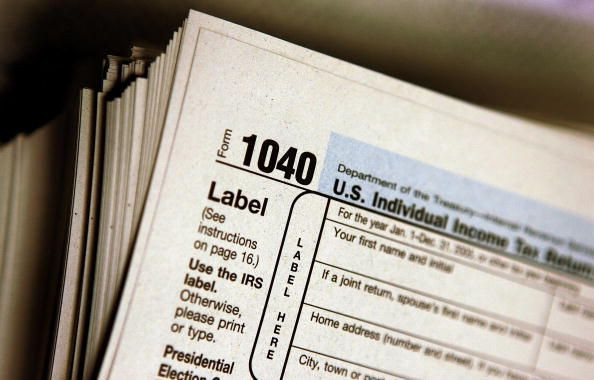Still Haven’t Filed Your Income Tax Return? Here’s What You Need To Know

If you’ve been dragging your feet on filing your 2015 taxes, today is your lucky day. This year’s tax deadline falls on Monday, April 18, rather than the typical April 15 deadline, giving procrastinators an extra weekend to finish the task. The extra few days will come in handy since Sunday is the most common day to file returns, and Friday is the least common.
Only 15 percent of Americans have yet to begin their return, according to the Adobe Digital Index (ADI), and for many the delay is often because they anticipate owing money. IRS data seem to support this fear, with the average refund amount steadily declining as the tax deadline nears and more returns are submitted.
Tax day dread is a common occurrence, taxes owed or not, as 27 percent of Americans would rather get an IRS tattoo than ever have to file their taxes again, according to a recent survey. Americans between 18 and 34 are particularly anxious about filing their taxes, mostly because they fear making a mistake. Still, many millennials will find themselves sitting in front of a computer this weekend, as nearly a quarter haven’t completed their tax return, according to the ADI.
For those just getting started, IRS Free File is a good place to begin. The program allows you to file your taxes for free online with user-friendly tax software like TurboTax. Free in-person help is also available to those who qualify through the Volunteer Income Tax Assistance program.
Monday’s deadline is undeniably tight, but it’s not impossible. Then again, if you’re feeling stressed, take a deep breath. You’ve got options.
File an Extension
“The IRS actually makes it really easy to file your own extension or do an extension payment,” said Jackie Meyer, a certified public accountant based in Southlake, Texas. “If you’re really that far behind where you’re not even starting until the weekend, you don’t want to rush and make a mistake.”
If your tax return is simple, it doesn’t make sense to request an extension, especially if you think you might get a refund. The majority of taxpayers, 80 percent, do receive a refund, to the tune of about $2,800 on average.
But if you owe money and need more time to make sure you’re maximizing your deductions, you can file an extension online through the IRS Direct Payment site as long as you can pay some amount toward your bill. “It takes like three minutes to walk through it and make a payment and do an extension,” Meyer said. Select Form 4868, which will automatically request an extension for you, and put as much as you can toward the amount you expect to owe.
Make a Payment Plan
If you owe taxes and can’t knock it all out by April 18, Meyer says there’s no reason to worry. “Pay as much as you can now and then pay the remaining balance by Oct. 15,” she said.
“If it’s going to be more than a year before you can repay, or past the extended Oct. 15 deadline, then call the IRS and find out what they recommend,” Meyer added. Making the phone call is a better approach than spending time filling out the application for an installment agreement, which is essentially a tax payment plan. “The installment agreement can take quite some time to fill out, and they’re not necessarily going to approve it,” she said.
The IRS charges a penalty for paying late, but it’s only half a percent of the amount due per month. That’s a fraction of the interest charged by a credit card company, so it’s definitely better to pay as you can through the IRS Direct Pay website rather than charge the amount to your credit card.
Maximize Tax Deductions
Americans open three times the number of individual retirement accounts between January and March than any other time of year, according to the ADI. Making a contribution to a tax-deductible retirement account like an IRA is a great way to reduce the amount of taxes owed, while also meeting your long-term financial goals. It’s a win-win for taxpayers.
A lesser known but equally good account for maximizing tax deductions is a health savings account. Similar to an IRA but designed for medical savings, those who have high-deductible health insurance plans can reduce the amount of taxes they owe by contributing to an HSA. To make the contribution for this year’s taxes, you need to have had a HSA open in 2015. Even if you can’t use the deduction for 2015, it could be worth starting now. “Set one up as soon as possible for 2016 so you can max it for next year’s taxes,” Meyer said.
Find an Accountant
Most accountants are already at capacity by this time of year, but if you need help it doesn’t hurt to reach out. Just don’t be offended if you don’t get a response. “There’s only so many hours in the day,” Meyer said. “We’re working nonstop.” If need be, file an extension on your own and then schedule an appointment with an accountant before the tax extension deadline of Oct. 15.
Working with an accountant can reduce the anxiety over making a mistake, but that peace of mind will cost more than $200, according to the National Society of Accountants.
Understandably, most accountants require payment of their fee upfront, before they file your tax return. If money is already tight, don’t let it add to your financial stress. “Try to work it out with them,” Meyer said. You might suggest paying a quarter of the fee first and then the rest after you receive your refund or when you get your next paycheck, he suggested. “There’s no IRS publication that states that we can’t file a return until someone’s paid their bill to us,” Meyer said.
© Copyright IBTimes 2024. All rights reserved.





















